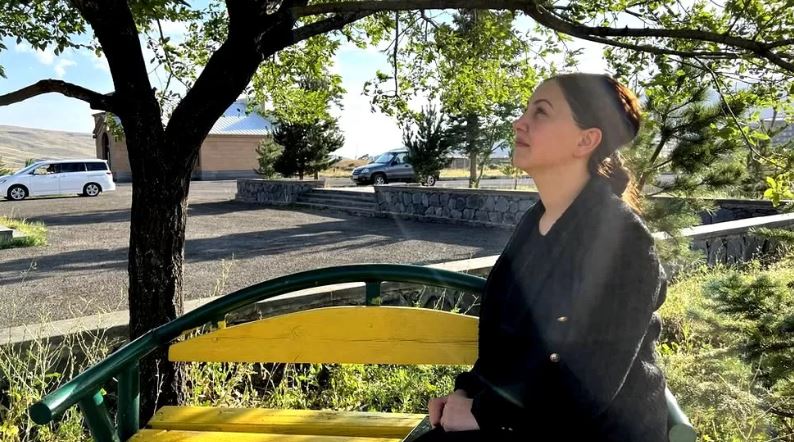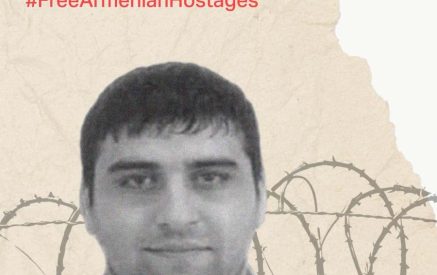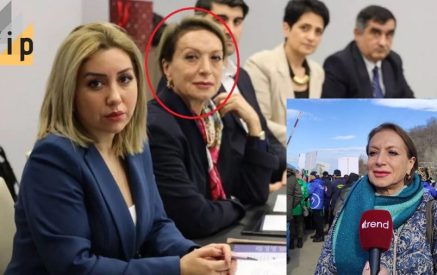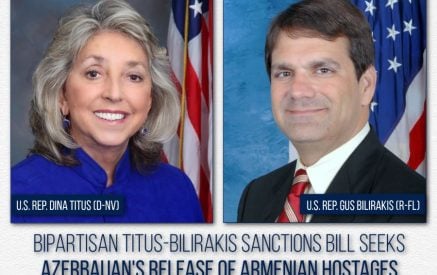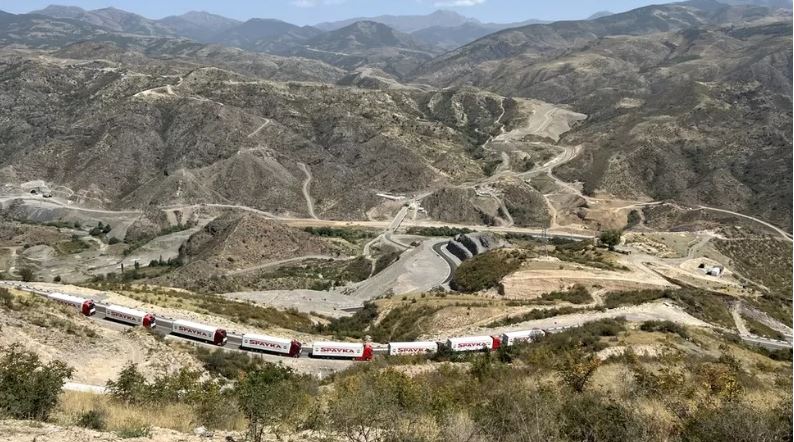By Rayhan Demytrie
BBC South Caucasus correspondent, Armenian border
They call it the Road of Life, as it is the only route connecting 120,000 ethnic Armenians living in Azerbaijan’s Nagorno-Karabakh region with the Republic of Armenia.
But for nearly nine months the Lachin Corridor has been blocked by Azerbaijani authorities, resulting in severe shortages of food, medication, hygiene products and fuel in the breakaway region.
Read also
Eighteen-year old Hayk is standing on the balcony of a modest hotel in Goris on the Armenian side of the border with Azerbaijan, speaking to his mother on a video call.
“No eggs, no sugar, there are no sweets at all, bread is being rationed, got up at 04:00 the other day to stand in the queue,” says his mother, speaking from the Karabakh town of Martakert.
Hayk is not his real name. I have changed it for his own safety.
Armenians are unable to reach their families on the other side of the Lachin Corridor because it has been blocked by Azerbaijan since December.
No independent media have been able to reach the Nagorno-Karabakh enclave. Photos and videos of empty shops have been circulating on social media.
“People are standing in queues for hours to get minimal food rations. People are fainting in the bread queues,” local journalist Irina Hayrapetyan says in a recorded voice message from inside the ethnic Armenian enclave.
“We have no fuel for transport and people have to walk many kilometres by foot to stand in queues to buy whatever they can to feed their families.”
Local authorities in Nagorno-Karabakh say one in three deaths is due to malnutrition.
“I know a case when a pregnant woman lost her child because there was no petrol to get her to hospital,” says Hayk’s mother.
She speaks of no gas since March, no fuel, no medication – not even shampoo – and regular power cuts. With winter coming it will get worse.
Her son feels hatred, fear and despair: “Because I understand sooner or later my home, my city, my country will be taken by Azerbaijan.”
For Karabakh Armenians their home is Artsakh, a self-declared republic that does not exist on the world map, as this mountainous enclave is part of Azerbaijan’s Nagorno-Karabakh region.
Despite having so much in common culturally, the two South Caucasus states of Armenia and Azerbaijan have fought for control of this land for decades in wars that have cost tens of thousands of lives.
In the most recent six-week war in 2020, Azerbaijan recaptured all the territories surrounding Nagorno-Karabakh held by Armenia since 1994.
A ceasefire brokered by Russia relied on the deployment of Russian peacekeepers to guarantee the safety of ethnic Armenians and to control the Lachin Corridor, allowing for the free movement of people and goods between Karabakh and the Republic of Armenia.
But with Russia’s focus on the war in Ukraine, Azerbaijan blocked the road to Nagorno-Karabakh’s regional capital Stepanakert (known in Azerbaijan as Khandendi) with government-backed environmental activists last December.
In April, Azerbaijan installed its own military checkpoint at the entrance to the Lachin Corridor justifying its “sovereign right” and “full restoration of its territorial integrity”. It accused Armenia of using the road to bring in military supplies, which Armenia denies.
The only international humanitarian organisation with access to Nagorno-Karabakh is the International Committee of the Red Cross (ICRC).
Although it has carried out medical evacuations it has not been able to guarantee safe passage, as the Khachatryan family found out on 29 July.
That was the day 68-year-old Vagif Khachatryan was being transported to Armenia’s capital Yerevan for urgent surgery for a heart condition.
“When they approached the Azerbaijani checkpoint, they said they needed to take him for 10 minutes to ask him a few questions,” says his daughter Vera Khachatryan. “My father was taken away with a Red Cross employee; a few minutes later the Red Cross employee returned but my father was taken in an unknown direction.”
Originally from Karabakh, she moved to the Armenian town of Jermuk after her village was returned to Azerbaijan as part of the ceasefire agreement.
“Now every minute, every second I am thinking: What if his heart stops?”
Azerbaijan’s authorities have accused her father of war crimes committed during the First Karabakh war in 1992.
“There are a lot of eyewitnesses who recognise him through media reports. We never said war criminals shouldn’t face justice,” says Hikmet Hajiyev, special adviser to Azerbaijan’s President Ilham Aliyev.
Vera says the accusations are untrue. “Defending your country is not a crime. There cannot be a fair trial in Azerbaijan. Maybe there will be justice one day, but we don’t have the time to wait for it.”
Vagif Khachatryan’s case has sent a shock wave among men in Nagorno-Karabakh. Three young Karabakh Armenian football players were detained this week at the same checkpoint for desecrating the Azerbaijani flag in 2021.
The fear now is that any ethnic Armenian male could face the same fate if they try to cross.
Vera’s two other sisters remain in Karabakh under blockade.
“My sister’s granddaughter is two months old, there is no baby formula, her mother does not have enough milk as she is not eating properly. There is no medicine for my 22-year-old nephew who was brain-damaged during the war, he lost his ability to speak and his right arm does not move.”
This month the US called on Azerbaijan to restore free movement along the Lachin Corridor during an emergency UN Security Council meeting on the crisis.
The International Court of Justice had already told Azerbaijan it had a legally binding order to allow “unimpeded movement of persons, vehicles and cargo” on the road in both directions.
But Armenians are sceptical of the international community’s commitment to resolve the crisis. Protesters in Yerevan have blocked the entrance to the UN office with food and sacks of flour to demand the road’s reopening.
Azerbaijan denies a humanitarian crisis is unfolding. It says it wants full control of the territory, and has offered an alternative supply route via the town of Agdam, retaken during the 2020 war.
“Then afterwards the Lachin road will be opened in 24 hours as well. More roads are better for everybody,” says the Azerbaijani president’s special adviser.
Hikmet Hajiyev says Karabakh Armenians have been offered the same “linguistic, cultural, religious, including municipal rights” as Azerbaijani citizens.
But Armenia’s ambassador at large, Edmon Marukyan, accuses Azerbaijan of making false promises when there is only one route connecting Armenia to Nagorno-Karabakh. “They want to try and change the focus of the international community, to dissolve the understanding and obligation of the Lachin Corridor.”
Former UN special rapporteur Gulnara Shahinian warns that severing the last link with the Republic of Armenia will spell annihilation for Karabakh Armenians. “You know what level of human rights violations occur in Azerbaijan. With their entire hatred policy, how could you expect that there would be a good attitude towards Armenians in Karabakh?”
A short drive from Goris, a mountain panorama offers a clear view of the current crisis.
On the Armenian side, nothing moves along a new road built to circumvent territory returned to Azerbaijan as part of the 2020 ceasefire agreement.
A line of lorries loaded with 400 tonnes of humanitarian aid for Karabakh, including food, medicine, baby formula and other essentials is parked along the approach to the Azerbaijani checkpoint.
Remembering the one thing Hayk’s mother misses most is cooking oil, I ask a lorry driver waiting in Goris what he is transporting.
“Twenty two tonnes of cooking oil.”



















































